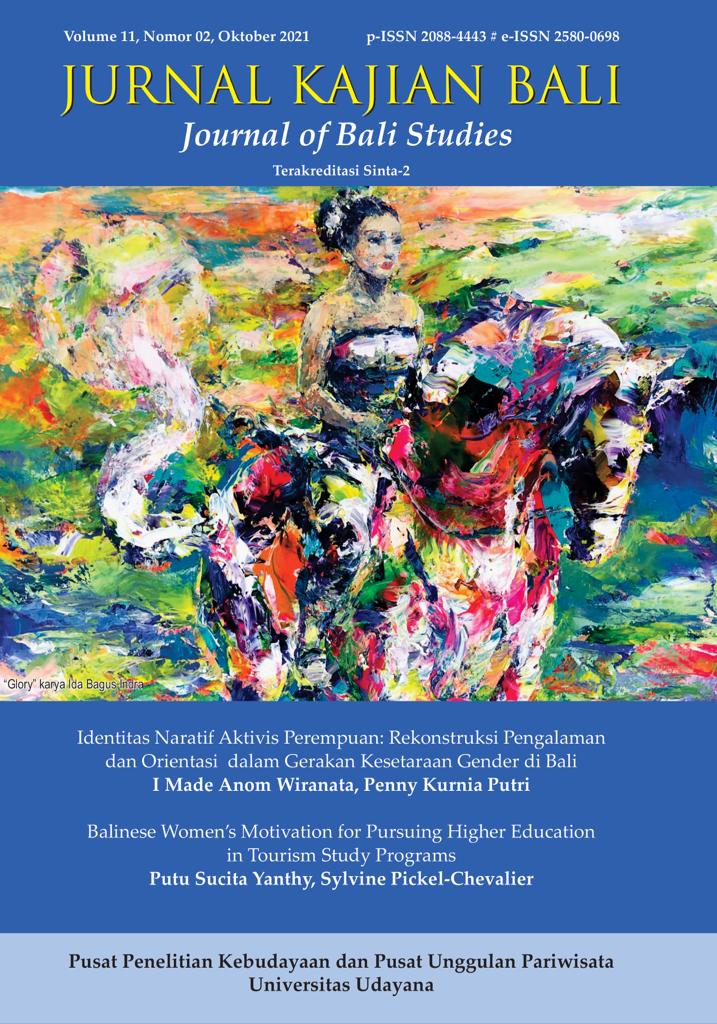‘Balish’: Bahasa Inggris Dialek Pekerja Pariwisata di Kawasan Wisata Kuta Bali
Abstrak
English plays an important role for workers in the tourism sector of all classes, including wholesalers, massage therapists, parking attendants, and shop assistants. Preliminary observations show that they, in general, use Balinese dialect of English or Balish. This article describes the Balish used in tourism area of Kuta, Bali, by tourism workers who have naturalized the English language by adopting several language features, especially Balinese and Indonesian, such as sentence structures, words, and expressions. The data were analyzed using The New Englishes theory and the results showed that the use of Balinese and Indonesian words in English resulted in the creation of new words, grammatical shifts, changes in word meanings, use of idioms, use of groups of verbs, and repetition of forms. Balish has adopted several grammatical features, both from Balinese and Indonesian, and it is hoped that one day it will have regular speakers so that it becomes a pidgin.
##plugins.generic.usageStats.downloads##
Referensi
Beratha, Ni Luh Sutjiati, (1989). An Investigation of Variables into English by Students at Udayana University. Tesis Master. Australia: Monash University, Melbourne Australia.
.
Beratha, Ni Luh Sutjiati, dkk. (2010). Communicative English for Primary School
Students. Denpasar: Disdikpora Provinsi Kabupaten Badung.
Beratha, Ni Luh Sutjiati, dkk. (2011). Word-List and Expressions for
Kindergarten. Denpasar: Fakultas Sastra Universitas Udayana.
Beratha, Ni Luh Sutjiati, I Wayan Ardika, I Nyoman Dhana. (2013). ‘Menangani
Masalah Marginalisasi Bahasa Bali: Merancang Model Revitalisasi Bahasa Daerah di Kawasan pariwisata’. Laporan Penelitian. Denpasar: Universitas Udayana.
Booij, G. (2007). The Grammar of Words: An Introduction to Morphology. USA:
Oxford University Press Inc, New York.
Dardjowidjojo, Soenjono. (2000). ‘English Teaching in Indonesia’. The English Australia Journal Vol 18 (1): 2 – 30.
Drozdova et all. (2015). “Situasional Communication in Teaching Russian as a Foreign Language to Beginner Learners”, Procedia-Social and Behavioral Sciences 215 (2015) 118-126.
Holmes, J. (1992). An Introduction to Sociolinguistics. Oxford: Blackwell
Iskandarwassid dan Dadang Sunendar. (2009). Strategi Pembelajaran Bahasa. Bandung: PT Remaja Rosdakarya.
Jones, G.M. (2007). ’20 Years of Billingual Education: Then and Now’. Dalam David Prescott (ed.), English in Southeast Asia: Varieties, Literacies & Literatures, 246-258. Newcastle: Cambridge Scholars Punlishing.
Jordan, J. (1990). Academic Writing. Oxford: Oxford Uinversity Press.
Kirkpatrik, A. (2010). English as a Lingua Franca in ASEAN: A Multilingual Model. Hong Kong: Hong Kong University Press.
Low, Ee Ling. (2010a). ‘English in Singapore and Malaysia: Differences and Similarities’. Dalam Andy Kirkpatrick (ed.). The Routledge Handbook of World Englishes, 229 – 246. London: Routledge
Low, Ee Ling. (2020). ‘English in Southest Asia’ dalam The Handbook of World Englishes. Cecil L. Nelson, Zoya G. Proshina & Daniel R. Davis (eds). New York: Wiley Blackwell.
Nelson, Cecil L., Zoya G. Proshina & Daniel R. Davis. (2020). The Handbook of World Englishes. Second Edition. New York: Wiley Blackwell.
Platt, J., H. Weber, & M.L.Ho. (1984). The New Englishes. London, Boston, Melbourne and Henley: Routledge and Kegan Paul.
Pujaastawa, I.B.Gd.; I Putu Sudana, Bambang Dharwiyanto Putro. (2019). “Daya Tarik Wisata Pura Langgar: Representasi Persaudaraan Hindu – Islam di Bali’. Jurnal Kajian Bali. Vol 09 (2): 521 – 546.
Romaine, S. (1995). Bilingualism. Cambridge: Blackwell.
Satori, Djaman dan Aan Komariah. (2009). Metodologi Artikel Kualitatif. Bandung: Alfabeta.
Suardana, Gede; I Nyoman Darma Putra; Nengah Bawa Atmaja. (2018). ‘”The Legend of Balinese Goddesses”: Komodifikasi Seni Pertunjukan Hibrid dalam Pariwisata Bali’. Jurnal Kajian Bali. Vol 08 (1): 35 – 52.
Takač, Visnja Pavicic. (2008). Vocabulary Learning Strategies and Foreign Language Acquisation. Multilingual Matters, Frankfurt Lodge, Clevedon Hall, Victoria Road, Clevedon, BS21 7HH, England.
Thornbury, Scott. (2002). How To Teach Vocabulary. England : Pearson Longman.

This work is licensed under a Creative Commons Attribution 4.0 International License.



